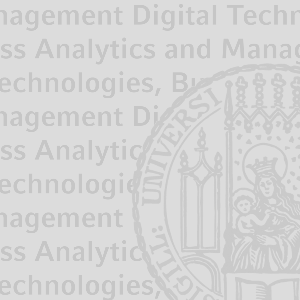- DE - Bitte beachten: Es gibt keine deutsche Kursseite, da der Kurs nur in Englisch angeboten wird.
- EN - Please note: This page has no German version because the course is only offered in English.
Quick Info: Master | Lecture (Fachspezifische Grundlagen, FSG) | English | Winter Semester | 9 ECTS
Description
In this course, students learn how to plan, implement, and evaluate digital solutions in company settings. A focus will be on new digital technologies, best-practices for manag-ing IT developments and business analytics. Exercise sessions will introduce students to programming data-centric solutions.
In recent years, there has been a dramatic increase in the use of digital technologies in management. The course focuses on the use of digital technologies in management. It covers topics such as business analytics, social media, blockchain etc.
The goal of the course is to help students understand how to use digital technologies to improve managerial effectiveness. They will learn:
- how to harness the power of business analytics to make better decisions,
- how to create effective social media campaigns that reach target audiences, etc.
Overall, the course provides students with a comprehensive overview of how digital tech-nologies are used in modern business settings. It equips them with the skills they need to take advantage of these technologies and become more successful managers. While there are risks associated with using digital technologies, there are also many benefits. Digital technologies make it easier for people to connect with each other and share information than ever before. They also enable businesses to operate more efficiently and reach new markets around the world.
There will be exercise sessions where programming is introduced. This also forms part of the exam. And there will be real-world case studies from practice.
Outline
Final dates and times will be shared via Moodle.
1. Start
Basic understanding of digital innovations
2. Digital product innovations
Descriptive approaches, network effects, privacy as a current challenge
3. Digital business model innovations
Descriptive approaches, data-based business model innovations as current challenges
4. Implementation of digital organisations
Approaches, governance structures, ma-turity models
5. Deep-dive IT-management
incl. SCRUM and agile management practice
6. Business analytics
- Use case definition, value creation
- Machine learning (ML)
- Big data
- Data management
- Managerial implications
Implementing real-world applications
(with R) and programming sessions

